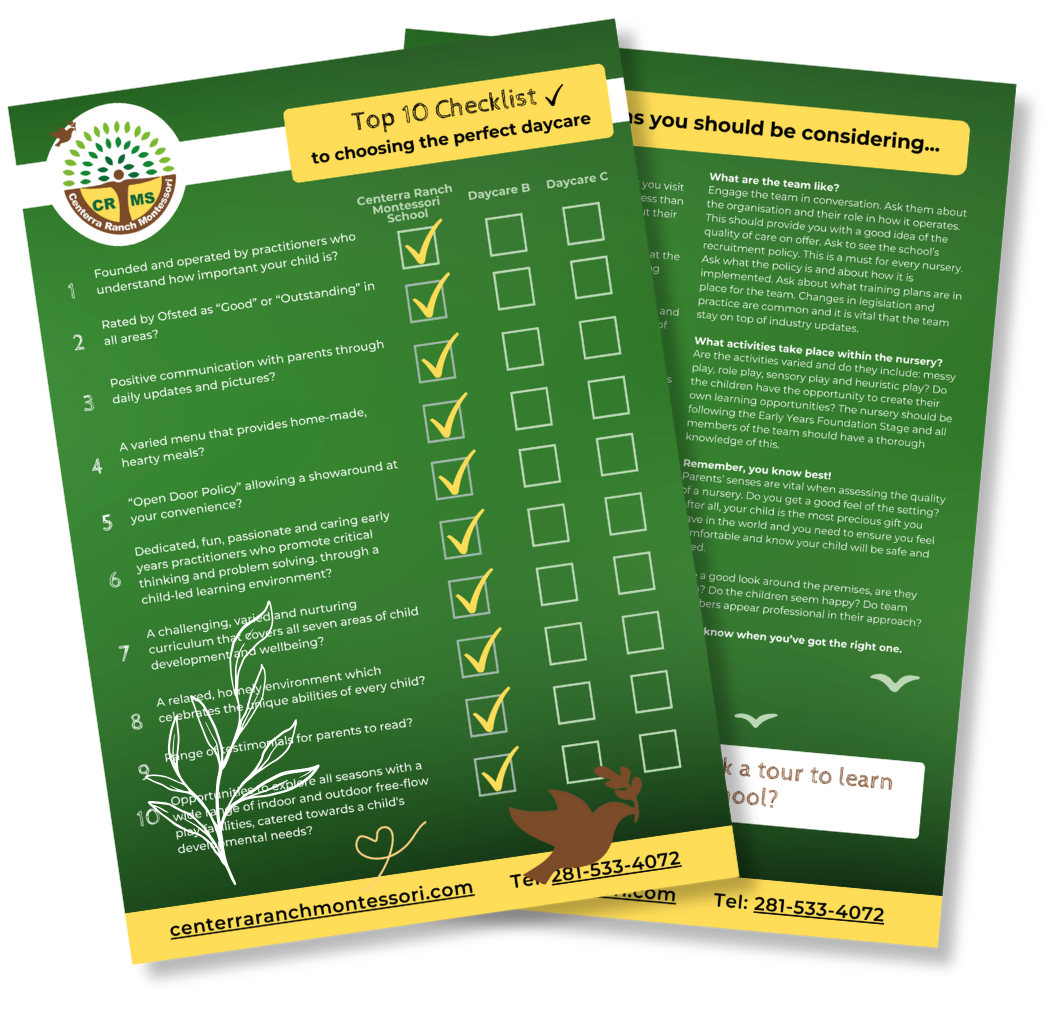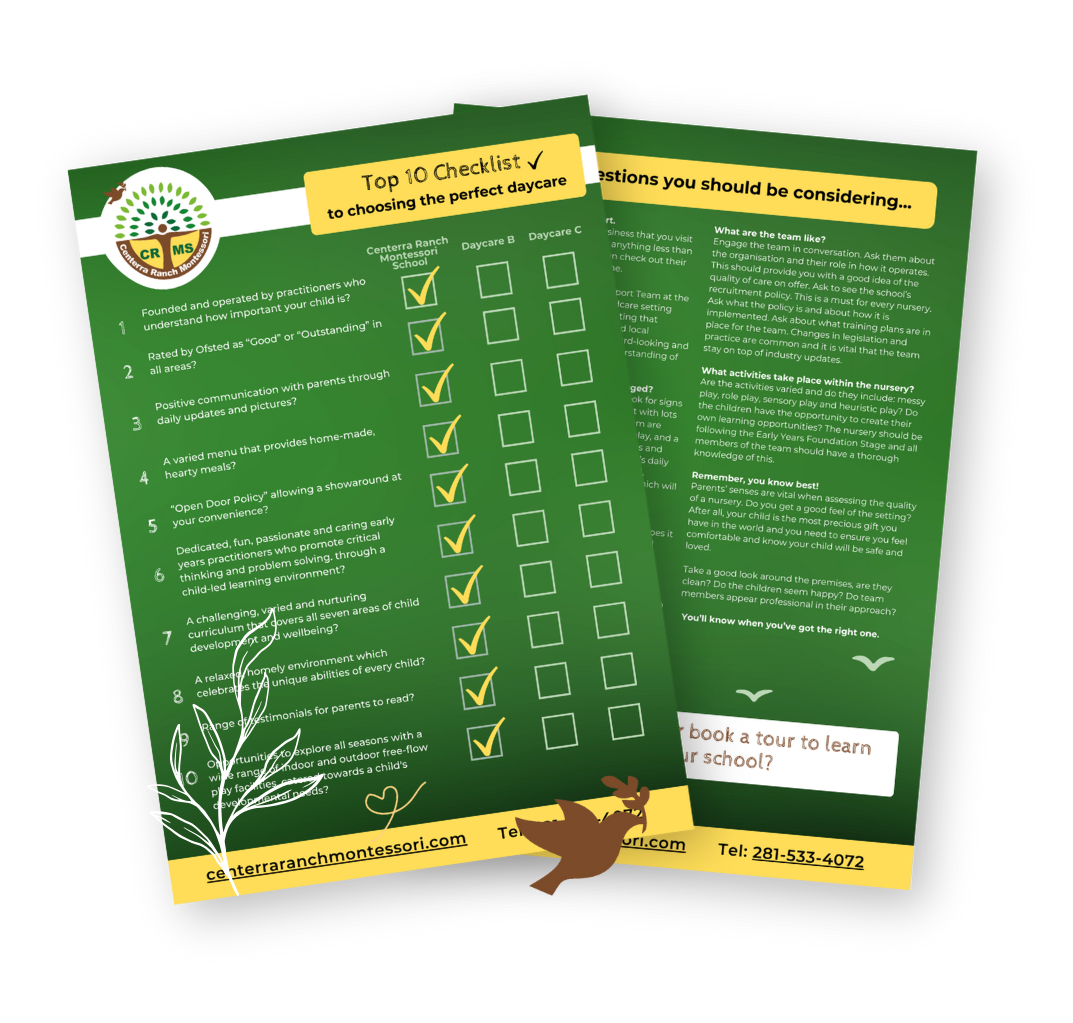Best Preschool and Educational Childcare Services In Fulshear, Texas

High-quality child care for children aged 6 weeks to 12 years old, Monday to Friday, 6:30 am to 6:00 pm
Gently Guiding Children Towards Excellence
Best Preschool and Educational Childcare Services In Fulshear
Gently Guiding Children Towards Excellence

High-quality child care for children aged 6 weeks to 12 years old, Monday to Friday, 6:30 am to 6:00 pm
Why Choose Centerra Ranch Montessori School for the best child care in Fulshear?
Everything we do is centered around our amazing children and it is our mission to provide the highest-quality childcare and education for your child. This is a pivotal time in your child’s development and it’s our job to provide a place that encourages children to explore the world around them!
In our school, we help children expand their comfort zones in a way that’s safe, secure, and highly individualized.



Get Our Free Parent Pack
We’d love to send you a FREE parent pack, full of helpful information about Centerra Ranch Montessori School…

About our Fulshear Location

Situated near Fulshear, our school is easy to access via major roads, making it convenient for parents to access during their commute between work and home.
Since our start in 2023, we have worked incredibly hard to create the best possible childcare service in Fulshear. Our team is working continuously to improve our facility and ensure that we are always following the latest and most up-to-date industry practices.
Our team is here to help your child develop the necessary life skills and self-confidence that will help them enter further education with ease and confidence.
Some of the aspects that make our facility unique include


Vast outdoor spaces complete with jungle gym and shaded areas for when the Texan sun is too much.

We are a Montessori school, meaning that we focus on nurturing the whole child, through individualized learning and mutual respect between children and teachers.

Each child has the freedom to explore independently and learn in a way that is tailored to their personal needs and interests.

We are trilingual; English, Spanish, and Hindi-Urdu.
What We Believe

At Centerra Ranch Montessori School we have a team of childcare experts and educators who are at the forefront of the latest industry innovations in childhood development and learning.
Our curriculum focuses on empathy, kindness, and respect for others and the environment. We are also committed to partnering with parents to raise enthusiastic, smart, and capable children!
Through interactions with other children and educational materials, your child will learn about the world while forming friendships that could last a lifetime.

The Best Childcare and Preschool in Fulshear, Texas for your child

We know how hard it can be to choose the perfect place for your little ones to learn and grow. So we have made it simple for you to find out exactly what to look for when choosing the perfect school. Get your copy now…



The Best Childcare and Preschool in Fulshear, Texas for your child

We know how hard it can be to choose the perfect place for your little ones to learn and grow. So we have made it simple for you to find out exactly what to look for when choosing the perfect school. Get your copy now…

Amazing Facilities For Your Child
Here's a small sample of some of the great things your child can enjoy when they join our setting…




Here’s What Our Happy Parents Have To Say
We LOVE our parents and carers and we're so proud to share some of their thoughts with you…

"When we first had to transition daycares we were hesitant about trying Montessori. Everyone here made the transition with their kind and caring approach. Our son learned so much here before he transitoned into the school district. He went in knowing most colors, then learned shapes, numbers and quite a few letters, all before turning three. He also tidies up and puts all his things in the correct place. All the teachers and the director director were so supportive, which is not always the case with a child who has autism."
- Felicitas
"My son attended the Katy location but when we moved to Fulshear we were so sad to have to switch schools. When they opened the new school in Fulshear we were so excited to enroll him. After one week of being here I noticed a huge difference in my sons attitude and behavior. He is so happy here. The staff are so kind and loving to the kids. My son is always excited to come to school and loves it here. Thank you Centerra Ranch Montessori for taking such good care of my little boy!"
- Abby Gonazales
"We previously had all three of our children (aged 1, 2 and 3) in the Katy location and now this location has opened, with some of the same staff we have moved our children to shorten our commute from Cross Creek Ranch. They are loving it as much as the previous location especially with the continuity of staff ensuring high standards. We couldn't be happier with the care, attention and learning they got there."
- Richard T
Our Commitment To Safety
Here at Centerra Ranch Montessori School, we take the safety of everyone seriously. We have put protective measures in place throughout our school.
Now, more than ever, maintaining a safe, clean, secure facility is vital. We have been committed to this cause from day one, and we are fully transparent so that parents can check in at any time.

Cleanliness Protocols
We use thorough cleaning methods to maintain an environment that stops the spread of germs. We also teach good hygiene, including diligent handwashing.

Security
We strictly limit access to our facility to authorized personnel and parents and family members who have express permission to be here. Your child’s safety is our top priority.

Transparency
We understand that you’re probably wondering what your child is up to when they’re not with you. That’s why we allow parents to check in by viewing our online streaming service.
Schedule a Tour at Centerra Ranch Montessori School
The best way to discover what makes Centerra Ranch special is to see it firsthand. We provide engaging and interactive tours at our Fulshear location daily. We look forward to meeting you soon and getting to know you and your child more!


Fulshear Location
7310 Katy Fulshear Road, Fulshear, Tx 77441
Katy Location
23144 Cinco Ranch Boulevard Ste H, Katy, Tx 77494

Privacy Policy | Copyright © 2024 Centerra Ranch Montessori School








